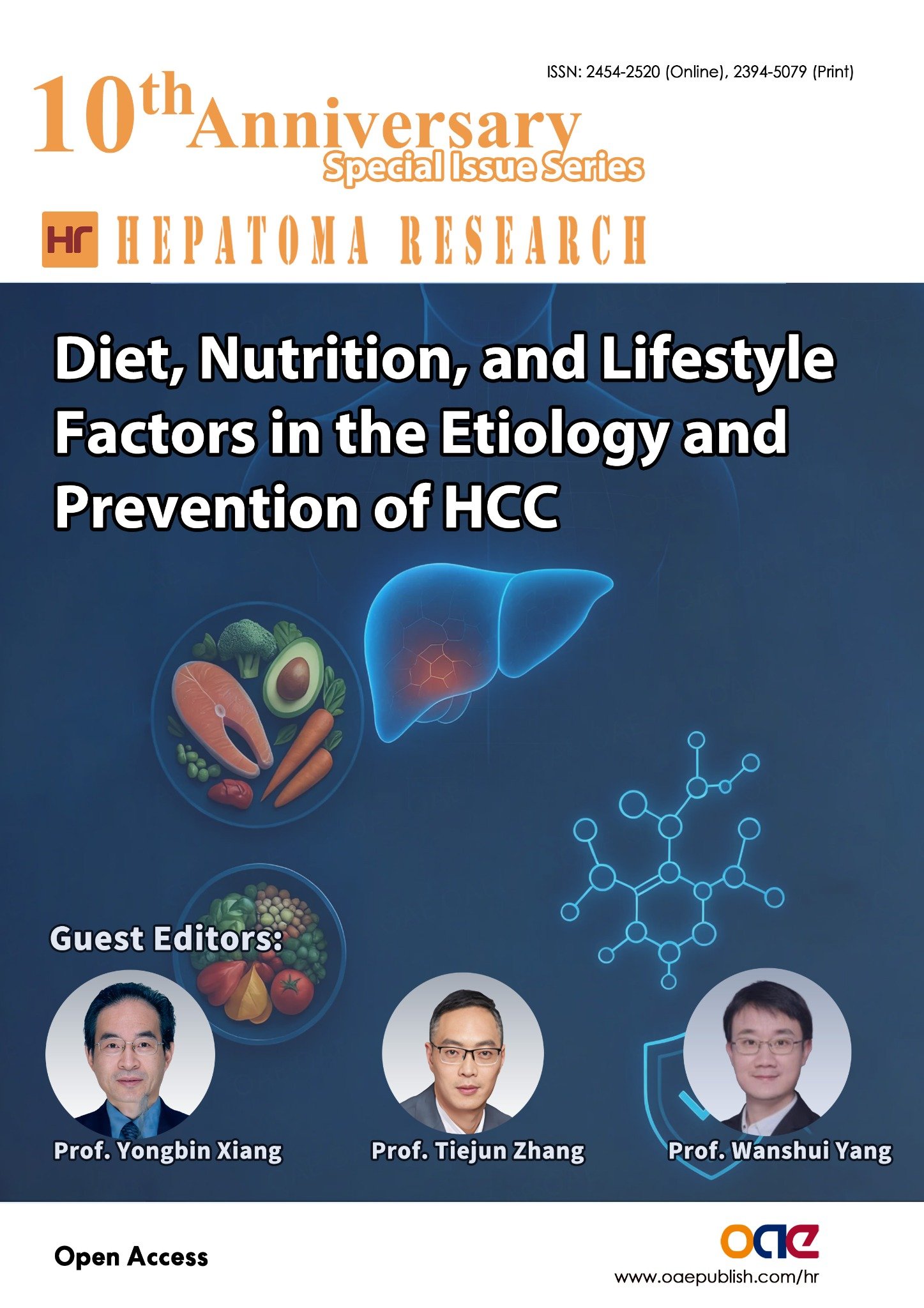
Topic: Diet, Nutrition, and Lifestyle Factors in the Etiology and Prevention of Liver Cancer
A Special Topic of Hepatoma Research
ISSN 2454-2520 (Online) 2394-5079 (Print)
Submission deadline: 31 Jan 2026
Guest Editors
Guest Editor Assistants
Special Topic Introduction
Liver cancer represents a significant global public health challenge, with a high mortality rate and substantial geographical heterogeneity in its incidence and burden. While incidence rates have stabilized or declined in some high-risk regions due to vaccination and antiviral therapies against hepatitis B and C, an alarming increase has been observed in several Western countries, paralleling the rising prevalence of metabolic disorders such as obesity and type 2 diabetes. This shifting epidemiology, alongside the persistent heavy burden in regions like East Asia (notably China) and Sub-Saharan Africa, underscores the urgent need to investigate a broader spectrum of risk factors beyond viral hepatitis.
The etiology of liver cancer is multifactorial. Established major risk factors include chronic infection with hepatitis B virus (HBV) and hepatitis C virus (HCV), aflatoxin exposure, heavy alcohol consumption, metabolic dysfunction-associated steatotic liver disease (MASLD), type 2 diabetes, etc. However, these established factors do not fully account for the observed epidemiological patterns. There is growing consensus that modifiable lifestyle factors—such as dietary habits, nutrient intake, smoking, physical inactivity, and obesity—play pivotal and potentially independent roles in hepatocarcinogenesis. A deeper understanding of these relationships, particularly through the lens of modern omics technologies (e.g., genomics, metabolomics, proteomics), is crucial for elucidating the biological mechanisms and advancing both etiological knowledge and preventive strategies.
This Special Issue aims to collate high-quality original research and review articles that explore the complex interplay between diet, nutrition, lifestyle, and liver cancer. We seek to advance the field by focusing on novel epidemiological findings, mechanistic insights, and implications for prevention and survivorship.
List of Topic Areas:
We welcome submissions addressing, but not limited to, the following themes:
1. Epidemiological Trends: Analyses of the incidence, mortality, and survival rates of liver cancer, with a focus on temporal trends and geographical disparities.
2. Early-Onset Liver Cancer: Etiological studies investigating the role of diet and lifestyle factors in the rising incidence of early-onset liver cancer.
3. Dietary Patterns and Behaviors: Investigations into the associations between specific dietary habits, dietary quality, and liver cancer risk.
4. Nutrients and Food Groups: Studies on the intake levels of specific dietary nutrients and food groups in relation to liver cancer.
5. Dietary Supplements: Research on the use of dietary supplements (e.g., vitamins, minerals, probiotics) and their impact on liver cancer prevention.
6. Specific Food Items: Examinations of the links between consumption of sugar-sweetened beverages, ultra-processed foods, and liver cancer risk.
7. Lifestyle Exposures: Studies on the relationships between smoking, alcohol consumption, and liver cancer etiology.
8. Body Composition and Energy Balance: Research on the roles of overweight, obesity, and physical activity in liver cancer development.
9. Survivorship and Prognosis: Investigations into how post-diagnosis diet, nutrition, and physical activity influence survival outcomes and quality of life in liver cancer patients.
10. Mechanistic Insights via Omics:
The mediating role of omics biomarkers (genomic, epigenomic, transcriptomic, metabolomic, etc.) in the relationships between diet, nutrition, lifestyle factors and liver cancer.
1) The mediating role of omics biomarkers in the relationships between diet/nutrition and liver cancer.
2) The mediating role of omics biomarkers in the relationships between smoking/alcohol and liver cancer.
3) The mediating role of omics biomarkers in the relationships between obesity/physical activity and liver cancer.
11.Molecular and Genetic Epidemiology:
1) Other molecular epidemiological studies exploring the mechanisms of liver carcinogenesis.
2) Genetic epidemiological studies, including gene-environment interactions, that elucidate how genetic susceptibility modifies the effects of diet and lifestyle on liver cancer risk.
12.Prevention and Control:
Epidemiological research on the prevention and control of liver cancer.
We cordially invite original research, meta-analysis and review articles spanning basic, etiological prevention, and clinical studies in development of liver cancer.
Submission Deadline
Submission Information
For Author Instructions, please refer to https://www.oaepublish.com/hr/author_instructions
For Online Submission, please login at https://www.oaecenter.com/login?JournalId=hr&IssueId=hr25092910227
Submission Deadline: 31 Jan 2026
Contacts: Vivienne Yan, Science Editor, [email protected]







